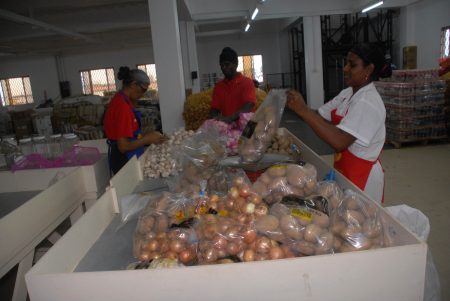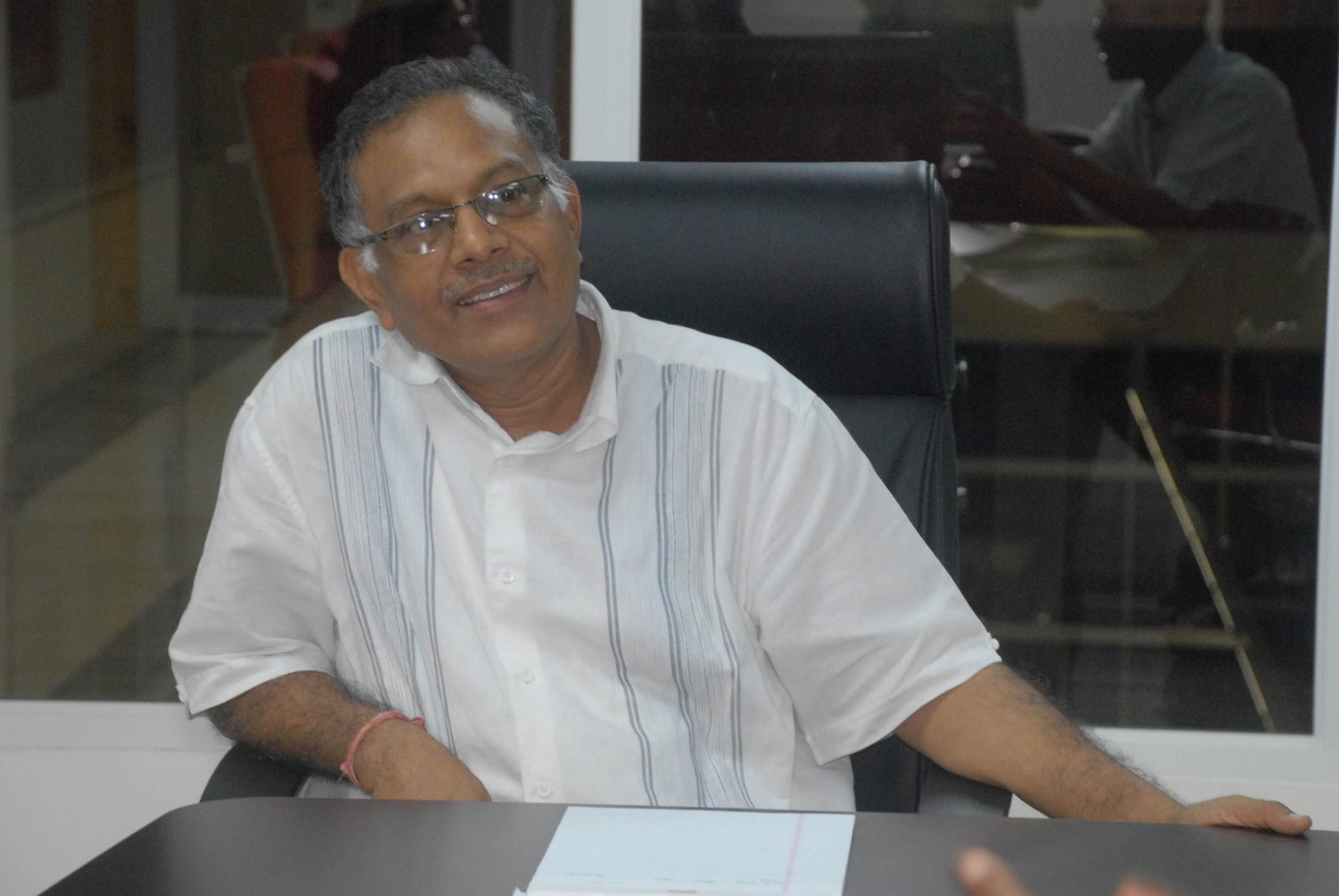The new multi-million dollar Mattai Food Market officially opened a week ago today provides, perhaps above everything else, encouraging signs of a measure of investor confidence in the country’s economy at a time when the soundings from local Business Support Organizations (BSO’s) are by no means excitedly upbeat.
When, on Wednesday, Stabroek Business asked Harry Mattai about his decision to launch Guyana’s largest ever supermarket in the midst of what some hard-nosed business persons regard as a period of economic uncertainty, he declared that his preference was for looking forward rather than becoming preoccupied with the moment. Afterwards, though not in so many words, he dropped a broad hint that his investment, apart from representing a measure of confidence in what he says is a growing customer base, seeks to provide his own ‘reading’ of where, as a country, Guyana appears to be headed. There is no direct mention of the implications of the commencement of oil exploration in 2020 for the supermarket industry, but the insinuation is unmistakable.
All of that aside, Mattai, a second- generation servant of the consumer goods industry, believes that the launch of the new supermarket complex, following four years of intense planning, is vindicated in the unstinting support he has received from his wife Barthi and his two children, Kiran and Suraj, both educated abroad but now fixtures in the venture.
A supermarket presentation and packaging team at work.When we spoke with the couple and their son on Wednesday their aura of humility in accomplishment was insufficient to conceal the sense of pride they evidently feel at having, only days earlier, presided over what, in effect, is one of the more significant investment undertakings by a local business entity investor for some time.
Harry says that the name -Mattai’s Food Market – is intended to convey the persistence of a family tradition in the food business that began with his parents in Stabroek Market seventy years ago. Ten years later they relocated to Tiger Bay at the corner of Water and Hope streets. On Wednesday, from the vantage point of the formidable structure that houses the latest Mattai business initiative, the older premises (which we were told will be cleaned up and retained as a part of the business) appeared decidedly dwarfed by its successor. When we asked Harry about his decision not to relocate such a prestigious project as the country’s largest supermarket to some better-appointed place in the city he responded that his decision to stick with Tiger Bay was a reflection of his faith in a community that had helped to take the establishment to where he is today. His huge investment in what is one of the more maligned urban communities in Guyana is, in a sense, one of his ways of ‘giving back.’
On the previous Friday, against the backdrop of the ‘crush’ of the launch of the new food complex the Stabroek Business had gotten only a limited sense of the magnitude of the undertaking. On Wednesday we were more completely seized of the role that the investment seems set to play in moving Guyana further into the modern supermarket age. Guyana is not the only country in the world where there is national discourse about the desirability of greater access to fresh and nutritious foods. The Mattais appeared as prepared to ventilate this issue as they were to ‘show off’ their evidently heavy investment in cost-cutting and labour-saving information and distribution technology.
The aisles are deep and the shelves are laden with a bewildering array of consumer goods. When we raised the issued of the imbalance between imported and local products on offer, Harry Mattai responded that rather than see it as a predisposition towards imports it should be seen as reflective of the limitations of the local productive sector. His Supermarket, he says, has set a high priority on providing both a market and an outlet for locally produced goods – whether agricultural produce or manufactured products – insofar as they comply with the quality standards embedded in the policy of the establishment.
Old habits that work die hard. A feature of the earlier cramped Mattai premises, and assortment of open ‘rice’ bags crammed with an array of spices and peas has been allocated generous space on the floor of the new supermarket.
One of the more attractive assets of the new Supermarket is the space that it affords shoppers. That is not a consideration that is universally afforded by supermarkets across Guyana. After we had been afforded a tour of the rest of the Complex by the Mattais on Wednesday, the issue of whether or not this was the largest supermarket ended abruptly.
Getting an ‘act’ of this magnitude together would have taken time, patience and specialist skills. The ongoing process of an unfinished ‘setting up’ process is manifested in the still only partially prepared spaces on the upper floors of the Complex which, in the fullness of time, will be occupied by the groups of administrative and technical personnel whose various skills will be essential to the effective management of the establishment. At full strength, Harry Mattai says, the Supermarket will employ around sixty persons.
This early though, on the floor of the complex above the bustle of the Supermarket, porters are in attendance inside a huge storage bond, bursting with boxes. The traffic of stock between the bond and the Supermarket floor is, thankfully for the porters, facilitated by a service lift. In another area, stern-faced looking young women are diligently at work preparing potato and garlic among other foods requiring a measure of ‘sprucing up’ before they reach the critical eyes of customers.
When we raised the issue of the country’s largest Supermarket’s disposition to serving as an outlet for locally produced manufactured goods and farm produce Harry Mattai’s countenance changed. He appeared to anticipate the question, disclosing that he had already entered into discourse with producers from various parts of the country. They are aware, he says, of criteria that have to do with quality and reliability. Those criteria, he says, the establishment will not compromise. If potential suppliers can live with high standards, there is a market there for them.
Beyond fruit and vegetables, the complex continues to be open to locally manufactured food flavourings and condiments. As we spoke with the Mattais, the most recent consignment of such goods displaying a handful of the popular brands were being electronically coded to facilitate the cash – out regime.
There is a training room served by the relevant IT-driven training aids. The staff of the Supermarket will benefit from ongoing training. Where such support is needed qualified support will be recruited. The space that will be used for engagements with marketing and other functionaries from clients, both local and foreign.
The Mattais have also invested in sophisticated sealing machines and wrappers to enable the packaging and labelling of raw produce brought into the supermarket by vendors to stand out. Mrs. Mattai is careful to make the point that product presentation is a ‘big deal’ with the company. There is a hi-tech touch to the software section and to checkout counters that already accommodate debit cards from Republic and Demerara Banks and the Guyana Bank for Trade and Industry, further assurance that the Mattais are aiming to give local consumers ‘the real deal.’
A persistent theme that ran through our conversation with the Mattais had to do not so much with simply ‘selling’ the goods on the laden shelves but with the application of adequate measures of orthodox management and technical skills, not least, careful image management to establishing a successful relationship between themselves and what they are confident will be a continually expanding customer base. That would appear to be a critical direction in which they have set their sights.





